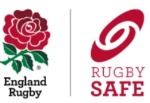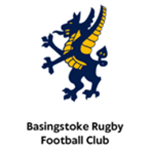
RFU RUGBYSAFE
RugbySafe is the RFU’s overarching player safety and wellbeing programme, putting player welfare at the heart of the game and covering how the game should be played and managed to ensure that rugby is as safe as possible.
As an affiliated RFU club, Basingstoke RFC ensures that is complies will all expectations within the RFUs RugbySafe programme. The RFU Regulation for RugbySafe is Regulation 9.
As part of the club's Regulation 9 responsibilities, the Rugby Safe Leads complete an annual RFU first aid risk assessment. This has been created in partnership with Howdens, the RFU insurers. It is reviewed/updated each season between the beginning of July and the end of September and throughout the season should any changes to regulations, guidance or club provision be made.
The RFU provides guidance and resources for all rugby activity organisers on what needs to be in place to create a fun and safe playing environment.
RFU training courses and development opportunities for coaches, match officials, teachers and other volunteers, increase awareness of the game’s key safety elements. These include online HEADCASE and TackleSafe courses, which must be completed by club coaches, first aiders and volunteers involved in player welfare and safety before the beginning of each season.
The RFU also engages in key safety research, with findings used to inform the game.
All RFU RugbySafe information can be found here. This includes Essential Guides and resources on subjects including medical conditions, protective clothing and equipment, first aider qualifications and first aid guides.
Basingstoke RFC Player Welfare Arrangements
Training
All players are entitled to train in a safe and player centred environment. To do this, as a minimum, the club ensures that their basic needs are met. This includes access to water, toilets and shelter which is made available in the clubhouse. Drinking water is also available by the front fire exit, closest to the pitches, outside of the clubhouse.
First Aid Arrangements and Emergency Procedures
The safety of all players is of paramount importance and not every injury can be prevented especially in a contact sport such as rugby. The club ensures that whenever a game or training occurs, at least one appointed and qualified first aider and first aid kit is present. The minimum ratio for first aiders to players is 1:40. This is a requirement of RFU Regulation 9.
Most first aiders and/or team managers will have access to a mobile phone for emergencies. However, if this is not the case or there is a poor signal, there is always access to a telephone in the clubhouse so emergency assistance can be summoned immediately.
There is designated vehicular access for responding emergency vehicles through the main club car park (Coniston Road) or via the Pack Lane entrance to the Hockey Club.
Information has been provided to South Central Ambulance to ensure attending vehicles are directed to the correct entrance, and these are;
- Top Pitches - say “Hockey Club entrance”, car park off Pack Lane. (What3words: ///disposing.waving.pleaser)
- Bottom Pitches - say “Rugby Club entrance”, car park off Coniston Road. (What3words: ///parade.yards.layers)
The South Central Ambulance operator should ask for this information at the time of the 999 call, if they do not please make sure that the caller provides the correct information.
Everybody involved in rugby at Basingstoke Rugby Club has a responsible attitude towards the prevention and management of any injury.
The safety of the individual ALWAYS takes priority over the game of rugby.
All appointed and qualified first aiders must be able to assess and attend to injured players without the interference of unqualified or un-appointed bystanders.
REMEMBER:
NEVER remove an injured player from the pitch to enable the game to continue.
NEVER lift or carry an injured player from the pitch if the player cannot move him or herself.
ALWAYS stop the game a serious injury is suspected.
Cardiac Arrest
Automated external defibrillators (AEDs) can be used safely and successfully by people with no specific training. Untrained members of the public have saved lives in this way, so lack of training should not deter people from using an AED. Familiarisation with AEDs is included in first aid and CPR training, as it gives people confidence to send someone to fetch an AED and to use it without delay.
The club has an AED inside the clubhouse, situated outside the office, by the fire exit. In the event that a cardiac arrest is suspected, typically, a trained first aider will take the lead in deploying the club AED. The assistance of others attending may also be required during this process.
One of the following Rugby Safe Leads MUST ALWAYS be called when the club AED is deployed:
Sarah Whatmore (Joint Rugby Safe Lead - Youth and Mini Section) – 07778 934468
Callum Nicolson (Joint Rugby Safe Lead - Senior Section) – 07730 567279
Injury reporting
All injuries incurred during rugby should be recorded by the team first aider and serious injuries requiring medical attention/follow-up must be reported to the Rugby Safe Lead and Club Safeguarding Officer.
Injuries must be reported to the Rugby Safe Lead and Club Safeguarding Officer whenever:
• An ambulance is called
• A neck/ back injury or other serious injury is suspected but an ambulance has been refused
• A concussion is suspected
• ANY head/other injury resulting in loss of consciousness of a player occurs
• A first aider suggests seeking further medical advice and this is declined by parents/carers
All injury/incident reporting is now completed on the RFU’s Proactive Tool. All first aiders and team managers have access to this reporting tool. Injuries that do not allow a player to return to play or result in them not attending the next session must be reported on Proactive. These include concussive incidents that may require further reporting and the management of the player’s return to activity and sport, (GRAS). Further information about this can be found on our Basingstoke RFC HEADCASE page and the RFU HEADCASE page.
All GRAS stages are recorded using Proactive and the completion of the RFU online Headcase course and a Stage 5 contact circuit assessment is a pre-requisite for all players before they are allowed to return to games.

